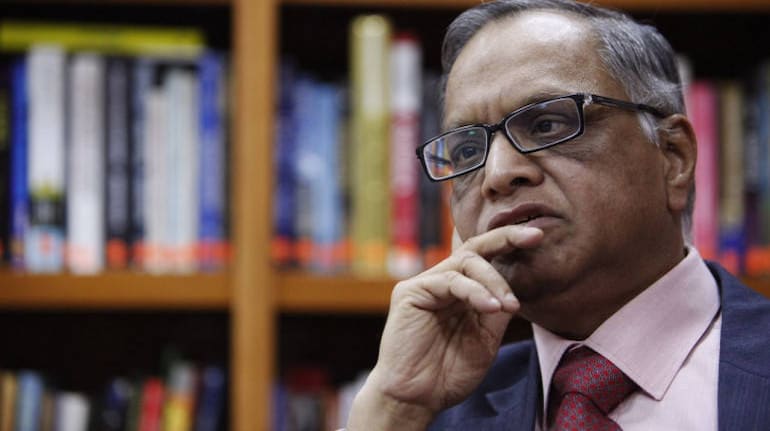



(This piece was written a day ahead of Vishal Sikka's resignation as Infosys MD and CEO)
Madhavan Narayanan
When Infosys listed on the prestigious, tech-heavy Nasdaq stock exchange in 1999, it was a symbolic moment of an Indian Renaissance, and NR Narayana Murthy, the chairman and co-founder of the Bangalore-based software giant, was undoubtedly the hero of the moment.
If his posing with golf clubs in the company's annual report then was an image of world-class aspirations and corporate governance, there was another image that connected him deeper with his own humble southern middle class origins. This was Murthy standing in a queue in the Infosys canteen, waiting his turn to have a thali meal with employees in a country where it was normal in corporate culture to separate dining rooms and toilets for senior executives.
It is important to remember this as the Infosys chairman stands a little frayed at the edges in retirement, having let go of control of the company he nurtured once, and in apparent friction with its board of directors picked largely by institutional shareholders who once lavished praise on Murthy.
Much has been said on the board-level tensions now on between Murthy and the board and CEO Vishal Sikka, a software product wizard who built gee-whiz products for German giant SAP, where he was the first-ever chief technology officer.
But a recent development interlocuted by co-chairman Ravi Venkatesan -that the board would be happy to "consider" Murthy's return appears like adding insult to injury. You cannot patronise a man expressing wistful regret at having left the company after a failed second coming. Murthy would probably neither desire, and nor does he deserve, a situation where he would be offering "inputs" to the board rather than calling the shots or shaping the culture.
It is difficult to imagine Murthy getting the role of a chairman emeritus (an ornamental position) and yet having a strong say in management. It is time perhaps for Murthy to not confuse wistfulness with a wish.
Murthy's apparent regret at having left Infosys after a second innings comes not from a control-freak basket of desires. His being upset over hefty separation packages, high acquisition costs and a culture where top-level executives take away multiples of what the average engineer does essentially stems from his egalitarian dreams. We have to recall the man who stood in the canteen queue to get a fair picture. This is not about ambition. This is about values.
On the other hand, Murthy built a company that thrived on low-cost services outsourced to India. The rapid march of automation in software and the rise of cloud computing as well as protectionism in the West has now changed the game.
Sikka is certainly able to connect the dots between the future of the services-oriented business that Murthy ran and his own product DNA - and that is why the board has thus far loved him. There indeed are signs of dissent among activist shareholders like Anil Sanghvi. But Sikka seems to be in command for now.
Infosys, which no longer loves hiring fresh graduates and turning them over to outsourced services, now needs the product touch and an innovation-oriented culture as a mainstream activity. Murthy's efforts to bring in such a culture in his second coming failed because he needed his own son Rohan's help - and that went against the culture of egalitarian meritocracy that Murthy had nurtured himself. Or it was perceived thus. The fact that the bright Rohan was not old enough to lead or experienced enough to be a hands-on leader in a new wave of innovation was an additional roadblock.
There is no doubt that Sikka is facing several challenges including senior-level exits, but few will deny Infosys needs to thrive on innovation rather than scale in the coming days. At the very least, it needs to mix the two well.
It is time for Murthy to realise that Infosys is now in a "What got you here won't get you there" kind of phase in which he needs to just take it easy. He can continue to exercise moral suasion on Infosys as some kind of an activist shareholder or at best an adviser at large - and for this, he does not need an additional chair to sit on or a title to carry.
(The writer is a senior journalist. He tweets as @madversity)
Discover the latest Business News, Sensex, and Nifty updates. Obtain Personal Finance insights, tax queries, and expert opinions on Moneycontrol or download the Moneycontrol App to stay updated!
Find the best of Al News in one place, specially curated for you every weekend.
Stay on top of the latest tech trends and biggest startup news.